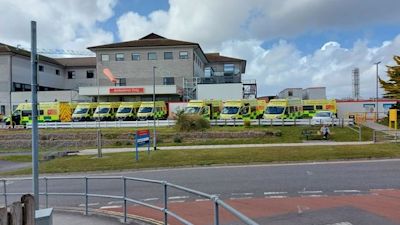Ambulances waited equivalent of seven years outside Devon and Cornwall's hospitals

Ambulances have been left waiting for the equivalent of seven years outside of Devon and Cornwall's three main hospitals in the past 30 months.
The region's NHS - including the ambulance service - has been under significant pressure for months as a result of the pandemic, high visitor numbers and an increase in people needing hospital treatment.
There have been queues of ambulances outside of hospitals, leaving patients waiting and crews unable to attend other incidents - even if they might be more urgent.
A lack of care provision is adding to the pressure, as healthy patients are unable to be discharged to free up beds.
Hospital bosses have apologised to patients caught up in queues but say changes are being made in a bid to reduce pressures on the healthcare system.
What does the data show?
Ambulances waited more than 67,000 hours outside of Derriford Hospital, the Royal Devon and Exeter Hospital (RD&E) and the Royal Cornwall Hospital between January 1, 2019 and June 30, 2021.
Patients taken to Plymouth's Derriford Hospital waited the longest, with South Western Ambulance Service crews spending a combined total of 27,120 hours waiting outside its A&E.
At Royal Cornwall Hospital - known as Treliske Hospital - in Truro, crews spent a total of 26,448 hours waiting.
At the RD&E, ambulances were waiting for a total of 13,425 hours outside.
In the first six months of 2021 alone, ambulances waited almost 24,000 hours outside the three hospitals – almost the same at the total for the whole of last year.
'Significant pressure'
A SWASFT spokesman said: “NHS services across the South West, including our ambulance trust, have been under significant pressure during the Covid-19 pandemic and especially this summer."
They said the ambulance service works closely with hospitals to minimise handover delays and also treats around half of patients over the phone or at the scene of incidents.
"We provide clinical care to our patients until they are handed over to hospital staff, and offer welfare support to our colleagues at various hospitals in our region,” they added.
'No easy answers'
In August, health and care leaders issued a joint letter describing “ongoing extreme surge in demand”, which included 700 people in need of care and support that was currently unavailable in Cornwall and the Isles of Scilly.
New theatres and diagnostic facilities are being created in Plymouth and at the former NHS Nightingale hospital in Exeter to try to cope with demand, while a new ward unit is under construction at Treliske.
Health bosses are also trying to recruit more hospital staff and are encouraging people to embark on careers in care.
The joint statement from all three hospital trusts says: “There are no easy answers to resolving these issues, which have increased since the start of the Covid pandemic.
“Patient safety is our number one priority and people are seen based on urgency and need.
“Emergency departments (EDs) are under extreme pressure due to the rising demand for services across the health and care system in Devon and Cornwall in recent years and patients are more unwell, meaning that more of the patients coming through our doors need to be admitted to hospital.
“Care providers also have rising demand for their services and are experiencing significant pressures due to a shortfall of people wanting to work in the care sector, which can impact on the ability to discharge people with very complex needs promptly from hospital and free beds for people waiting to be admitted from ED.
“These issues have been further complicated throughout the pandemic by the need for additional infection prevention and control measures and the need to keep patients with Covid separate from others.”
All three hospital trusts re-iterated their message issued throughout the summer, that people should only call 999 if it a life-threatening emergency.